62. SQE Results Revealed: Interpreting Your Exam Performance
Welcome to our comprehensive guide on interpreting your SQE exam performance. In this blog post, we will provide you with a step-by-step analysis of your SQE results and offer valuable insights into understanding your performance. Whether you are a solicitor, trainee, or aspiring lawyer, this article is designed to help you make sense of your scores and provide guidance on how to improve for future exams.
Understanding Your SQE Exam Results
When SQE exams are released, it’s essential to know how to interpret your results effectively. The SQE assessment system uses a scaled scoring method to determine performance. This means that your actual score will be adjusted based on the difficulty level of the questions you answered correctly.
Each SQE exam is divided into sections or tasks, and your performance is evaluated separately for each one. The scoring criteria may vary depending on the specific exam, but overall, the interpretation process remains consistent.
Let’s break down the key aspects of interpreting your SQE exam results:
1. Scores
The first thing you’ll see when accessing your results is your scores. These scores reflect your overall performance on the exam and are typically presented as a percentage. It’s important to note that the passing score for each SQE exam may differ, so be sure to check the specific requirements set by the SRA.
However, percentages alone may not provide a complete picture of your performance. So, pay attention to the next crucial aspect – the competency statement results.
2. Competency Statement Results
The SQE exams are designed to assess your competence in various areas of legal practice. Competency statements are used to guide the examiners in evaluating your performance. These statements describe the tasks or skills you need to demonstrate proficiency in.
For example, one competency statement might be “communicating with clients effectively.” Your competency statement results will give you a breakdown of how well you performed in each of these areas. This breakdown offers valuable insights into your strengths and weaknesses, helping you identify which areas require further improvement.
You will be given a score for each competency statement, typically represented with a letter grade (e.g., A, B, C, D). This grading system allows you to see at a glance which areas you excelled in and which ones need more attention.
If you receive a lower score in a particular competency statement, don’t be discouraged. It’s an opportunity for growth and development. Consider seeking additional resources or enrolling in specific courses or training to strengthen your knowledge and skills in those areas.
Improving Your SQE Exam Performance
Now that you have a clear understanding of your SQE exam results, you may be wondering how to improve your performance moving forward. Here are a few actionable steps you can take:
1. Analyze Your Competency Statement Results
Take the time to thoroughly analyze your competency statement results. Identify the areas where you excelled and celebrate your achievements. Similarly, pinpoint the areas where you struggled and devise a plan to improve your performance in those areas.
Consider leveraging additional resources such as practice exam questions and mock exams to enhance your understanding and application of the relevant skills. For SQE 1 practice exam questions, check out our SQE 1 Practice Exam Questions. You can also access SQE 1 Practice Mocks FLK1 FLK2 to further simulate the exam experience.
2. Seek Further Training and Support
If you find that you need additional guidance in certain competency areas, consider enrolling in specialized courses or training programs. These resources are designed to help you bridge any knowledge gaps and provide you with the skills necessary to excel in your future SQE exams.
For SQE 2 preparation courses, our experts at SQE Exam Law offer comprehensive training that covers all the essential areas. You can learn more about our SQE 2 preparation courses here. We also offer specialized training for SQE 1, which you can explore here.
3. Develop Effective Study Strategies
Improving your exam performance requires effective study strategies. Consider reviewing your study routine and make necessary adjustments. Create a study schedule that allows you to cover all the relevant topics and allocate sufficient time for practice.
Additionally, familiarize yourself with the SRA SQE exam dates to ensure you have ample time to prepare. You can access the latest exam dates here.
4. Learn from Your Mistakes
Lastly, remember that setbacks and mistakes are inevitable in any learning journey. Embrace them as opportunities for growth and improvement. Take the time to review and learn from your mistakes, whether they were related to content knowledge or exam strategy.
By identifying your weaknesses and working to overcome them, you’ll not only enhance your exam performance but also develop the resilience necessary for a successful legal career.
Conclusion
Interpreting your SQE exam performance is crucial for understanding your strengths and areas for improvement. By analyzing your scores and competency statement results, you can gain valuable insights and take actionable steps to enhance your performance in future exams.
Remember, improving your SQE exam performance is a continuous process. By leveraging additional resources, seeking further training and support, developing effective study strategies, and learning from your mistakes, you’ll pave the way for success in your legal career.
If you have any questions about interpreting your SQE exam results or need assistance with your exam preparation, our team at SQE Exam Law is here to help. Contact us today to explore how we can support you on your journey to becoming a qualified solicitor.
